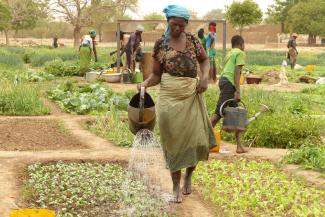Research
Pathways out of extreme poverty and hunger

The team working on the Institute for Development and Peace (INEF) research project spent four and a half years investigating “Ways out of Poverty, Vulnerability and Food Insecurity”. Their approach was to identify good-practice projects on social security, land-tenure security and value chains in Ethiopia, Benin, Burkina Faso, Cambodia and Kenya and to examine their effectiveness in reducing poverty. The results flowed into recommendations for German development policy.
One of the research team’s findings is that the ultra-poor cannot be helped out of poverty without social security systems. At present, donors and even non-governmental organisations (NGOs) focused on poverty reduction feel the extremely poor and the ultra-poor are often beyond reach.
The INEF researchers believe that needs to change. The best solution in their view would be to create social-security systems in the world’s poor and extremely poor countries. They see two different models for this: one based on direct, unconditional cash payments for individuals or families where no one is fit for work, the other is involving insurance-based solutions for those who are fit for work but have no chance of finding work (see Hans Dembowski’s Monitor article in D+C/E+Z e-Paper 2019/11).
To set up either system, a poor country needs at least temporary financial support, which Germany should help to provide. Also important is the need to see the vulnerability of people living just above the poverty line. It is equally important to stop vulnerable households slipping (back) into poverty as to help the extremely poor lift themselves out of poverty (called “graduation”).
The International Labour Organization (ILO, 2014) wants to see a universal and sustainable social-protection system established worldwide (initially in the form of health and pension insurance) to prevent people from falling below the poverty line.
Support in the agriculture sector
The study shows that support in the agricultural sector should be provided not only for medium-scale farming but also for smallholders. At present, farming-support programmes are often too limited, especially where communities are poor or the climate is challenging. So far, the focus has mostly been on promoting agricultural production itself. Land tenure and land-use security and the need to conserve natural resources are not always sufficiently taken into account (see our article in D+C/E+Z e-Paper 2017/07, Focus section).
Ideally, development-policy measures in the agricultural sector should do the following:
They should support programmes or projects securing longterm land-use rights – especially for women. When land titles are registered, for instance, traditional land-use rights should not be lost. Individual land titles are not the best solution everywhere. Secondary rights (overlapping, unclear or disputed rights of use) also need to be taken into account. The conflict between arable land farmers and nomadic pastoralists in the Sahel countries of Burkina Faso, Mali, Niger and Chad is a clear example (see Djeralar Miankeol in Focus section of D+C/E+Z e-Paper 2017/07).
Soil and water conservation measures should be implemented wherever necessary and appropriate. The restoration and, above all, improvement of soil fertility – and thus productivity – are also important measures, on which further support can build. A change in land use can be useful here, for example for the introduction of irrigation, diversification of crops or planting of (fruit) trees.
The success of support for agriculture can hinge crucially on infrastructure development, for example construction of roads to permit access to markets or connection to power and water-supply systems to facilitate product processing. The thrust of strategy should be generally towards integrated rural development.
It is also important in this context that small farmers should have access to loans (through a group or cooperative project, for instance, with stored produce as collateral). Credit is often needed for production, for example to recruit extra labour during short planting periods.
Agricultural support
Another relevant aspect of credit access is the length of time granted for loan repayment. This should extend two to four months beyond the harvest period so that producers can profit from price rises and are not forced to sell at low post-harvest prices. In light of the need in many countries for (simple) mechanisation, additional financing options should be created with repayment periods spanning two to three years. This would enable poorer households to purchase equipment such as a hand tractor.
Analysis at INEF also revealed that, alongside collective support for production, more thought should be given to cooperative resource-management models. Good examples of successful endeavours in this area are seen in Ethiopia and Burkina Faso. Another area where the researchers believe action is needed is in the creation of cooperation structures for entire water-catchment areas. This is being undertaken by the government in Ethiopia, although in a top-down approach.
Producer cooperation and organisation up to regional and national level are a key to market power, both on the sales side and for the procurement of agro inputs and equipment. Moreover, a project in Kenya shows another benefit: a stronger lobby (for example for women’s groups), which should also be more vigorously supported.
References
Institute for Development and Peace (INEF), 2016–2020: Good practice reports and comprehensive case studies as well as strategy papers on the research project (some of them only in German).
https://www.uni-due.de/inef/inef_projektreihen.php
ILO, 2014: World social protection report. Building economic recovery, inclusive development and social justice. Geneva.
Frank Bliss is a professor of social anthropology at Hamburg University and an independent development-policy consultant.
bliss.gaesing@t-online.de
Karin Gaesing is a geographer and spatial planner at Duisburg-Essen University and an independent development-policy consultant.
kgaesing@inef.uni-due.de
















